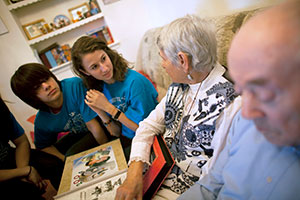 By Becca Bakal, MPH
By Becca Bakal, MPH
Welcome to this first post in a series! In this three-part series, I’ll share the results of the Norton & Elaine Sarnoff Center for Jewish Genetics community needs assessment conducted over the past year. The community needs assessment findings will inform our future programming and outreach.
What is a community needs assessment, you may ask? Well, I’m glad you want to know! Community needs assessment involves gathering information from a population about its strengths and areas for potential growth.
At the Sarnoff Center, we spent the past year on our first comprehensive accounting of how people of Jewish ancestry and their families understand and engage with information about Jewish genetic health. 223 Jewish professionals and community members from around Chicagoland and Illinois participated in our needs assessment.
In this post, I’ll share a few highlights of what we learned about the “state of the knowledge” around Jewish genetic health: what people know, and don’t know, about this topic.
Knowledge of Jewish Genetic Health Is Low
Overall, we found that knowledge of Jewish genetic health is low. People might be aware of Jewish genetic disorders and hereditary cancers, but they don’t know what these concerns mean for their own health or for their families’ health. Even the most highly educated needs assessment participants had trouble navigating all the genetic testing options they encountered.
Myths
We found that there are several common myths about Jewish genetic disorders that keep people from seeking information and genetic screening, when appropriate. For example, many participants thought that interfaith couples are not at risk of passing on Jewish genetic disorders. In fact, carrier screening is strongly recommended for interfaith couples because anyone can be a carrier for any disorder.1
Barriers to Learning About Jewish Genetic Health
In addition to myths, participants faced other barriers to learning about Jewish genetic health.
- There was a prevailing sense of fear around genetic risk
- Participants felt that issues related to family planning and cancer risk can be very personal
Participants said that “ignorance is bliss” and they would rather not learn more, because the information was “scary.” Additionally, people don’t often want to seek information or resources in community spaces about these personal issues, and they may not know what to Google to find the information that would be most relevant to their situation.
In a handful of interviews and focus groups, participants shared that this project was their first exposure to Jewish genetic health topics. While this was not the experience of the majority, it illustrates what we found in the community needs assessment: that Jewish genetic health literacy is far from ubiquitous.
Next up, I’ll be discussing how life experiences and demographics influence exposure to Jewish genetic health information. A full report on our needs assessment is forthcoming, so keep an eye out for it on our website!
1. https://www.acog.org/-/media/Committee-Opinions/Committee-on-Genetics/co691.pdf?dmc=1


